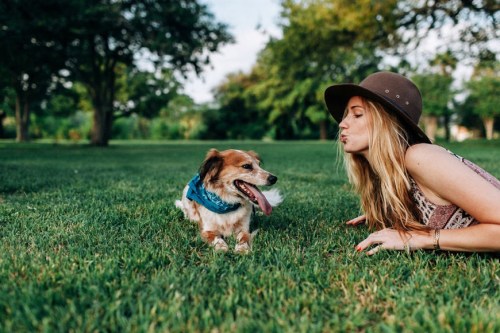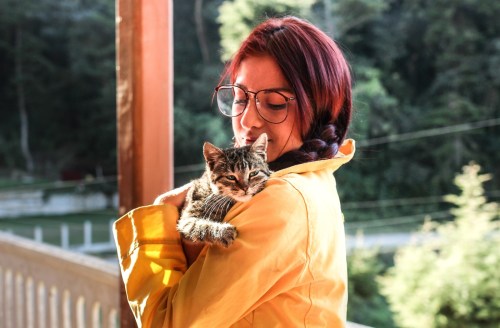Can your anxiety—and other health issues—have an impact on your pet?
Experts reveal whether pets can pick up anxiety, depression, colds, the flu, or other illnesses from their owners—and how to keep your pet healthy and happy when you're not feeling well.

As any pet owner can attest, ensuring Fido’s health and happiness is next-level important. After all, our fur children are family—they’re the ones we trust most to vet our new love interests, make our weddings extra adorable, and get us through those creepy/gory flashback scenes in Sharp Objects.
But what happens if your health—mental, physical, or both—hits a decline? Not only does it become harder to keep up with all the exercise, grooming, and emotional support that an animal requires, but you may also worry that your illness is going to rub off on them. Like, if you’re suffering from major anxiety, does that make them feel anxious, too? Or are they at risk of catching your summer cold?
Below, animal wellness experts explain how to deal as a pet owner when you’re feeling less-than-amazing—and how to ensure the fluffier members of your household keep the wag in their tails, too.
Keep reading to learn how your pets are affected when you’re under the weather.

How your mental health impacts your pet
If you live with anxiety or depression, it’s scary to think your mood could negatively affect your dog or cat. Of course, our animals can be very receptive to our emotions. (To wit: A small study recently showed that dogs rush to be with their humans when they hear crying sounds.) But rest assured, your four-legged friend isn’t going to “catch” symptoms of anxiety or depression from you. “We are more likely to project our feelings and concerns onto them,” says Laurie Johnson of Austin Urban Vet Center.
That said, your pet can be anxious or depressed, even if the root cause has nothing to do with your own well-being. In fact, your experience may be beneficial in understanding what’s going on with your pet. “Some of the signs of depression in dogs are very similar to symptoms exhibited by depressed people,” says Rachel Barrack of Animal Acupuncture in New York City. These can include aggression, lack of interest in activities they once liked, changes in sleep patterns, and reluctance to exercise. (Cats show similar signs.)
Major life changes—moving to a new home, adding a new pet to the household, a major loss or death, or an injury—could be contributing factors. “Consult your veterinarian to help determine the underlying cause and what changes can be made to get your pup back to being their usual happy self,” says Barrack.
Your vet may recommend spending more time with your pet and giving them more exercise, which can have a positive impact on you as well. And while depression and anxiety don’t always allow for a consistent routine, if you can keep one for your pet, it will help them stay emotionally balanced.

How to keep your pet healthy when you’re sick as a dog
As long as you practice good hygiene, it’s rare for your pets to pass anything on to you—so you don’t have to kick your pup or kitty out of bed. (Phew!) But animals can contract human illnesses. These can include some strains of the flu, food poisoning, giardia, mumps, and ringworm, says Barrack.
“Making sure your health issues do not affect your pet requires the same vigilance as protecting other family members and friends,” she explains. “Practice cleanliness and proper hygiene.” Barrack suggests keeping pets away from toilets and used tissues, especially when you’re sick. If you believe your or your pet may be suffering from any illness, consult both your physician and your vet.
Another thing to consider: When your physical health is majorly compromised, providing for a pet—physically, emotionally, even financially—can be a much bigger task. Whether you’re dealing with a migraine and can’t take your pupper outside, or you’re battling cancer head-on and are worried about the animal’s future, you can still ensure the best for them. “Sometimes, it can take a village,” says Johnson.
She recommends recruiting friends and family to help you out with your pets. Apps like Rover will link you up with professional pet sitters, dog walkers, and people who provide boarding. And, if the need arises, consider estate planning for your pets.
What’s most important is to make your own health a top priority. As Johnson puts it: “You have to take care of yourself in order to take care of others, including your pets.” That homemade dog food isn’t going to prep itself, you know.
Looking for your fur-ever friend? Find your pet soulmate with a little help from astrology, and then make sure your healthy home is filled with pet-friendly plants.
Sign Up for Our Daily Newsletter
Get all the latest in wellness, trends, food, fitness, beauty, and more delivered right to your inbox.
Got it, you've been added to our email list.










